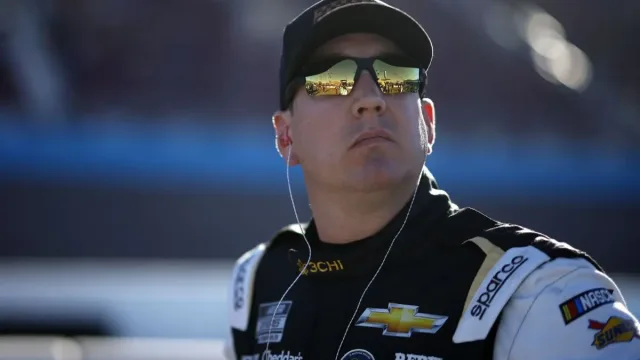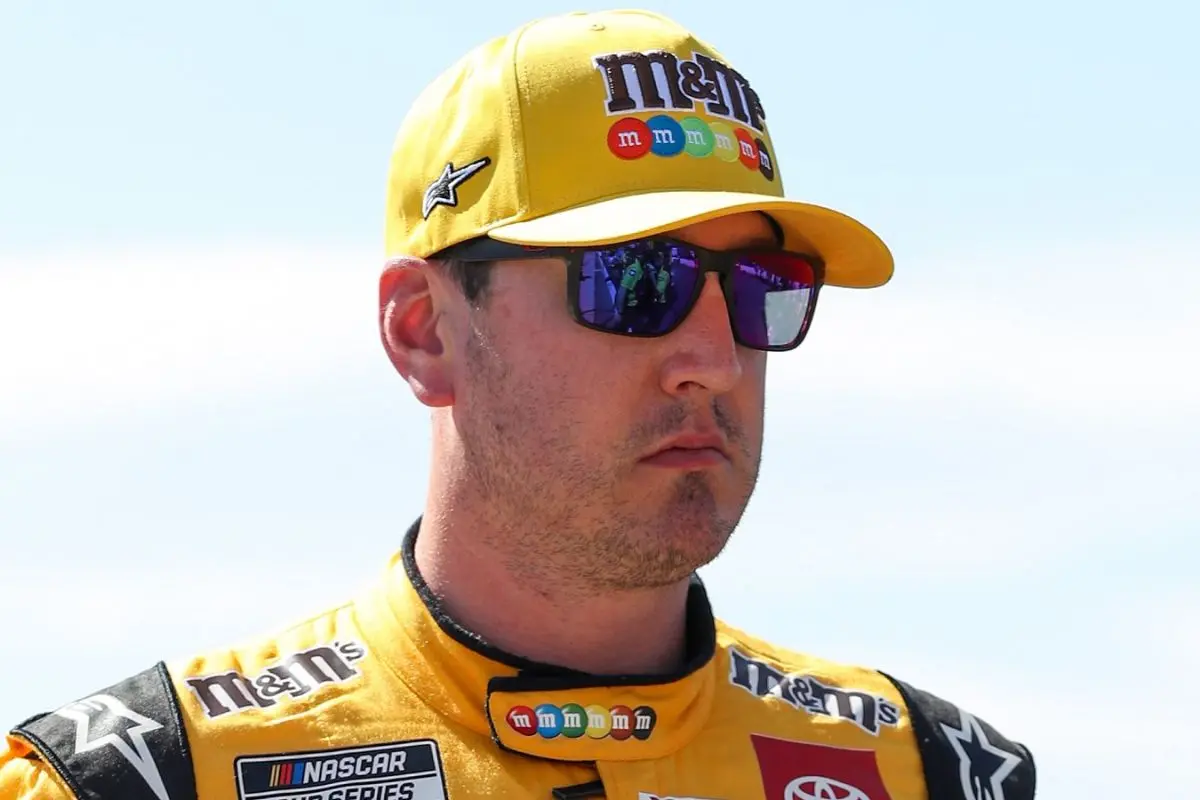Kyle Busch’s cannabis paint scheme rejection by NASCAR has sparked intense discussions among fans, highlighting the corporate complexities of the sport’s sponsorship regulations. The sleek design, intended to promote 3CHI, faced backlash as fans pointed out the perceived hypocrisy of allowing alcohol and pharmaceutical brands while stifling cannabis representation. This incident reflects broader societal shifts regarding cannabis acceptance, revealing a disconnect between NASCAR’s policies and contemporary cultural norms.
Key Highlights
- Fans are frustrated with NASCAR’s rejection of Busch’s cannabis-themed paint scheme, viewing it as inconsistent with allowed alcohol and pharmaceutical sponsorships.
- The controversy highlights the tension between NASCAR’s strict regulations and evolving societal norms surrounding cannabis legalization.
- Many fans express a desire for NASCAR to adapt its policies to reflect contemporary cultural trends and attitudes toward cannabis.
- Humorous comments among fans reveal a coping mechanism for dealing with the disappointment and a longing for creative expression in the sport.
- The rejection has sparked passionate discussions within the NASCAR community, emphasizing the importance of fan involvement in marketing decisions.
Kyle Busch’s Current Status and Sponsorships
Kyle Busch finds himself at a significant crossroads in his NASCAR career, steering through the challenges of a winless season while maintaining his status as the highest-paid driver in the sport. This contrast of financial success against the backdrop of competitive disappointment raises questions about the sustainability of his current path at Richard Childress Racing (RCR). The 2025 season looms large, demanding not only personal redemption from Busch but a collective resurgence from the #8 crew.
The departure of M&M’s from NASCAR’s sponsorship fold has undeniably cast a shadow over Busch’s career. Despite this setback, the influx of diverse new sponsors—ranging from Rebel Bourbon Whiskey to groundbreaking cannabinoid brands—has introduced a fresh dynamism into his racing identity. These partnerships demonstrate Busch’s appeal as a “sponsor sweetheart,” adept at attracting a wide array of backers.
However, the future of his association with brands like 3CHI remains uncertain, particularly as doubts grow about their commitment beyond 2025.
The evolving landscape of sponsorships signifies a significant moment for Busch. While he has successfully diversified his portfolio, the implications of a winless season cannot be overlooked. Success on the track is paramount; it not only reinforces his marketability but also solidifies his stature as a perennial contender.
The 3CHI Partnership and Reduced Sponsorship
The partnership between Richard Childress Racing (RCR) and 3CHI has undergone substantial changes, reflecting the complex interplay between sponsorship dynamics and the evolving regulatory landscape surrounding hemp-derived products. Initially forged three years ago, this collaboration aimed to utilize the burgeoning interest in hemp-based products, particularly as public sentiment has shifted toward legalization in numerous states.
However, the evolving regulatory environment has prompted considerable reconsiderations in sponsorship commitments. As of 2024, 3CHI has been forced to scale back its involvement with RCR, now committing to sponsor only the championship race in Phoenix. This reduction is indicative of the broader tensions within NASCAR and the cannabis industry.
Despite the increasing acceptance of hemp-derived products, particularly with the legalization of recreational marijuana in 24 states, the stigma and regulatory hurdles persist. The political climate surrounding hemp-based cannabinoids remains fraught, influencing corporate decisions and sponsorship approaches.
3CHI’s announcement of a reduced sponsorship position highlights the challenges faced by companies operating within this controversial domain. The need for a robust marketing activation and tactical content plan, as outlined in their renewed deal, indicates an attempt to navigate these complexities while maintaining visibility in the competitive NASCAR landscape.
The Forbidden Paint Scheme
A striking concept for a paint scheme was ultimately sidelined, emphasizing the ongoing tensions between innovation and regulatory constraints within NASCAR’s sponsorship landscape. The proposed design for Kyle Busch‘s Chevy Camaro ZL1 at the championship race in Phoenix was set to feature a sleek white base adorned with eye-catching marijuana leaf patterns, branching away from the conventional black and gold associated with sponsor 3CHI. This bold departure aimed to encapsulate a cultural shift towards cannabis acceptance and branding, yet it failed to secure NASCAR’s approval.
And now… the moment you’ve been waiting for. 🏎️🔥 @KyleBusch’s Phoenix race car design is here! While it didn’t hit the track, we’re proud to share what we created. Bold, fast, and ready to take on anything—this is what could’ve been. What do you think? #NASCAR #RaceCarDesign… pic.twitter.com/FxORuei6wd
— 3CHI (@3ChiCanna) November 15, 2024
The rejection of this paint scheme highlights the complexities of NASCAR’s regulations, particularly regarding sponsorships tied to cannabis products. While the racing world has seen a gradual acceptance of non-traditional sponsorships, the rigid framework governing what is deemed acceptable remains a formidable barrier. This particular scheme was not merely a superficial design alteration; it represented a larger conversation about the evolving nature of sponsorship in sports, especially as public perception of cannabis continues to change.
Moreover, the matching firesuit that was to accompany this design would have further solidified the thematic coherence of the brand’s message. However, the necessity to adhere to longstanding traditions and regulations led 3CHI to revert to their established colors for the race, ultimately dampening what could have been a groundbreaking moment in NASCAR’s history.
NASCAR Fans React to Rejection
Many fans have expressed their discontent with NASCAR’s decision to reject Kyle Busch’s cannabis-themed paint scheme, revealing a growing frustration with the sport’s apparent double standards. The reactions have been vociferous, particularly on social media, where stakeholders of the NASCAR community have aired their grievances.
Many fans perceive a hypocrisy in the league’s marketing policies, noting that while sponsorships from alcohol and pharmaceutical companies are commonplace, a cannabis-themed design is deemed unacceptable. One fan articulated this sentiment sharply, questioning why NASCAR permits the promotion of “big pharma” and alcohol brands but draws the line at cannabis.
“They’ll advertise big pharma, alcohol, and straight up scam businesses but not cannabis! That would be stepping over the line!”
This criticism highlights an inconsistency that many see as representative of broader societal attitudes toward cannabis, despite its increasing legalization and acceptance in numerous states. Another outspoken fan echoed this frustration by remarking on the irony of endorsing what they termed “shitty beer brands” over a product that has gained notable traction and acceptance.
“But we can have shitty beer brands on the car 🙄,”
These reactions suggest that fans are not merely reacting to Busch’s paint scheme rejection but are also challenging the overarching values and perceptions of the sport. The backlash emphasizes a desire for NASCAR to align its policies with contemporary societal norms, particularly as attitudes toward cannabis continue to evolve.
The Humor and Diecast Discussion
Occasionally, humor emerges as a coping mechanism within the NASCAR community, especially in the face of controversial decisions like the rejection of Kyle Busch’s cannabis-themed paint scheme. Fans often turn to wit as a way to navigate the complexities of regulations and personal opinions, emphasizing their shared frustrations.
One fan’s quip, “I wonder high, I mean why,” encapsulates the bewilderment felt by many regarding the governing body’s stringent stance on such an otherwise innocuous design.
The sentiment that “NASCAR is no fun” resonates with a segment of the fanbase that yearns for a sport that welcomes creativity and cultural relevance. The contrast of traditionalism in NASCAR against modern societal shifts regarding cannabis usage highlights a disconnect that some fans find increasingly perplexing.
Furthermore, the clever remark, “If somebody makes a diecast the stoners will buy it,” reveals an astute understanding of market dynamics. The diecast phenomenon is a fascinating aspect of NASCAR fandom; collectors are often driven by trends, nostalgia, and the unique quirks of the sport.
News in Brief: Kyle Busch’s Cannabis Paint Scheme Rejection
The rejection of Kyle Busch’s cannabis-themed paint scheme has sparked a considerable discourse among NASCAR fans, highlighting the intersection of sports, sponsorship, and societal perceptions of cannabis. As the dialogue unfolds, it reveals underlying tensions regarding branding in professional sports and the evolving attitudes toward cannabis in contemporary culture. This incident serves as a case study in the complexities of commercial partnerships and the influence of fan sentiment on the decision-making processes within the racing community.
ALSO READ: Kyle Busch to Kickstart His Dirt Racing Career With Highly Anticipated Chili Bowl Debut



